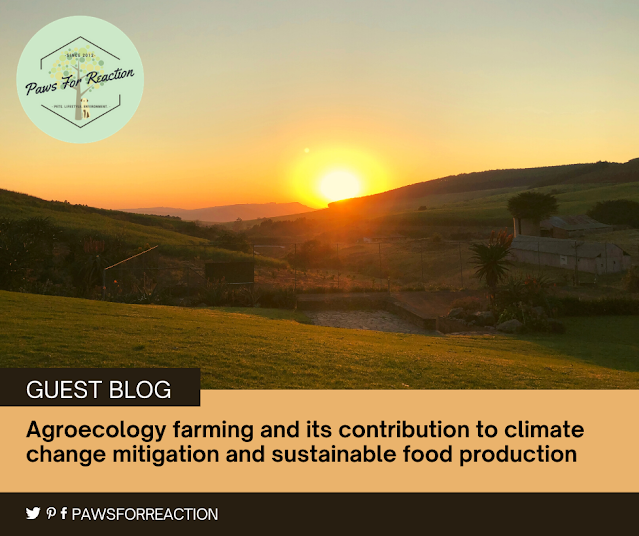
Agroecology farming in Africa: Climate change and sustainable food production
International guest blog: Agroecology farming and its contribution to climate change mitigation and sustainable food production
 |
| International guest blog by Tulyahabwe Rogers (from Uganda, East Africa). So excited to welcome him to the Paws For Reaction extended family! |
Severe, diverse, and location-specific impacts on agricultural production are anticipated with climate change. The last IPCC report indicates that the rise of carbon dioxide and associated greenhouse gases could lead to a 1.4 to 5.8 °C increase in global surface temperatures, with subsequent consequences on precipitation frequency and amounts. The 2013 report of the IPCC authoritatively re-affirms that climate change and variability will impact food and fiber production around the world due to the effects on plant growth and yield by the elevated carbon dioxide, higher temperatures, altered precipitation, and transpiration regimes, and increased frequency of extreme events, as well as modified weed, pest and pathogen pressure. Therefore, more durable benefits will likely result from radical agroecological measures that will strengthen the resilience of farmers and rural communities. Traditional farming systems are repositories of a wealth of principles and measures that can help modern agricultural systems become more resilient to climate change.
More than 220 million people in Sub-Saharan Africa for example do not have enough to eat, and nearly one in four are undernourished. With population growth outpacing food production, and 60% or more of the region’s population depends on agriculture for food and income, those numbers are growing.
 |
| Photo provided by Roger |
Rising temperatures and drought, among other extreme weather events, already threaten food production for some of the world’s most climate-vulnerable countries, improving the agricultural output of smallholders through agroecological farming could be massively beneficial in delivering the UN SDG 2: Zero Hunger, achieve food security and improve nutrition, and promote sustainable agriculture. Agroecology addresses the root causes of hunger, poverty, and inequality by helping to transform food systems and build resilient livelihoods through a holistic approach that balances the three dimensions of sustainability– social, economic, and ecological or environmental. Agroecological agriculture supports small farms that are diverse, integrated, and uses low levels of input to ensure the long-term balance between food production and the sustainability of natural resources.
A number of international organizations and African NGOs say that agroecology should be the future of agriculture on the continent (which is absolutely a good idea), but broader adoption requires training and support for farmers to embrace the approach, instead of relying on the short-term convenience of expensive chemical inputs.
The benefits of agroecological farming for example in Sub-Saharan Africa according to the 2008 UN study on the productivity performance of organic and “near organic” agriculture in Africa found that average crop yields increased by 116 percent (128 percent in East Africa specifically), with a corresponding increase in household food security.
Agroecological techniques can improve the resilience of farming systems by increasing diversification through poly-cropping, agroforestry, integrated crop and livestock systems, and the use of local varieties. This resilience can reduce the risks of pests, diseases, and the costs of seeds. The management of soil fertility through rotation, cover crops, and manuring can increase soil water retention, offer a better response to droughts and floods, reduce the need for irrigation, and help avoid land degradation. Moreover, soil quality is improved with higher levels of organic matter, which helps mitigate climate change by sequestering carbon in the soil.
With certainty, therefore, some degree of climate change will have to be confronted by the agricultural sectors across all countries, thereby rendering adaptation imperative. It is essential that steps be taken to support farmers and households engaged in agriculture to cope with both the threat of climate variability as well as the challenges that climate change will pose on future livelihood opportunities.
Meet the international guest blogger: Rogers is a lawyer by Profession, an environmental blogger for Planet Earth and the Green Revolution, and a social justice activist from Uganda. He developed an interest in environmental issues especially due to the lack of food sovereignty in Africa given the management of food markets by the few corporations at the expense of the majority of citizens in different communities around the world.




















0 Comentarios